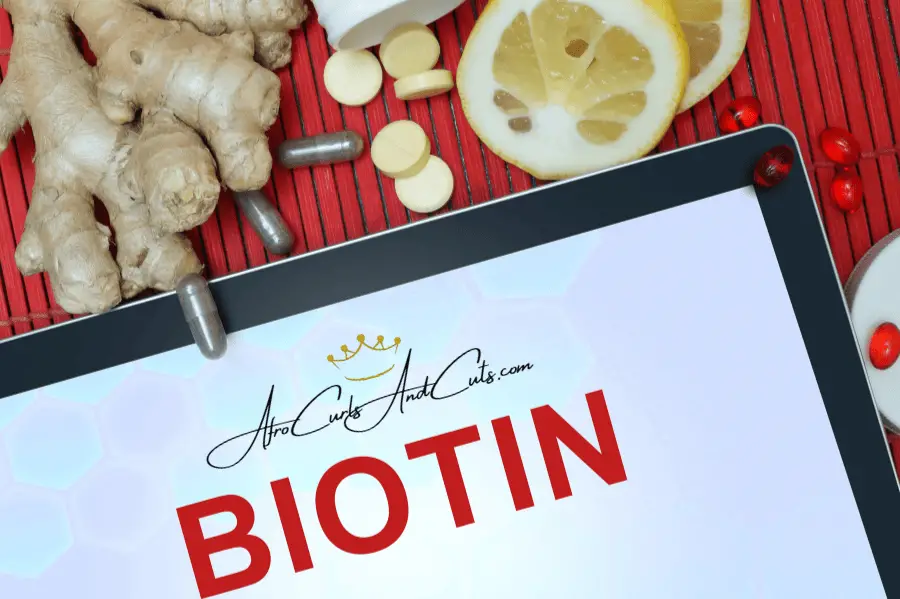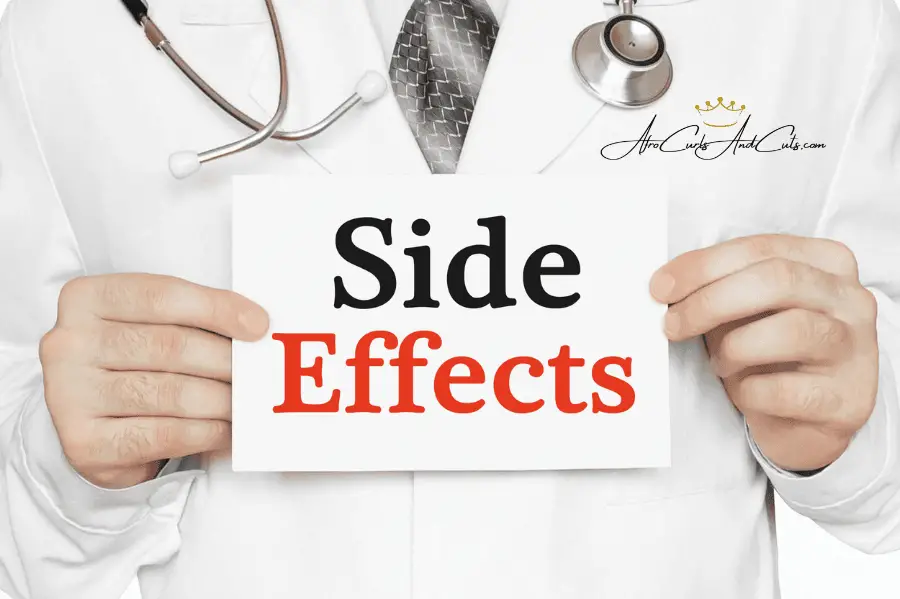We may earn money or products from the companies mentioned in this post.
This article asks the question of whether is 10000 mcg biotin too much for hair growth.
You’ve probably heard that biotin is excellent for hair growth, but you’re not sure how much to take.
Some people recommend taking just 2,500 mcg of biotin per day for hair growth, while others recommend up to 10,000 mcg. So, is 10,000 mcg of biotin too much?
The truth is that there’s no single definitive answer to this question. Everyone’s body is different and will absorb and use biotin differently. In this article, we will look at what the science says about biotin and hair growth and offer some tips on how much biotin you should.
Click here for Amazon Annual Audible Membership!
You can find an excellent biotin supplement in Amazon
What is biotin for hair growth?
There is a lot of information on the internet about biotin and hair growth. Some sources say that taking 10,000 mcg of biotin can help promote hair growth, while others claim that this much biotin can be harmful. So, what’s the truth? Can taking too much biotin lead to adverse effects, or is it safe to use?
Biotin in your diet is important to help stimulate hair regrowth and helps your body metabolize fats and proteins, which are essential for developing new hair cells.
Note that biotin is also a key ingredient in the production of keratin, a protein that gives strength to hair and prevents it from breaking.
B7 vitamin can be found in many foods and hair-care products, such as shampoos and conditioners.
BIOTIN-RICH FOODS
A lot of what we eat contains some level of biotin, which can help you reach adequate intake. A well-balanced diet will improve hair and nail health. Here are some biotin-rich foods that can help hair growth:
- Peanuts
- Almonds
- Sunflower seeds
- Red and white meat
- Sweet potatoes
- Egg yolks
- Broccoli
- Organ meat
- Avocados
- Fish
- Raw egg whites
- Whole grains
- Onions
Too much of a good thing?
It’s important to note that taking too much biotin may negatively impact your health. For example, people with thyroid problems or who are pregnant shouldn’t take too much biotin. This is because it can induce hyperthyroidism or hypothyroidism respectively.
Additionally, people who have had their gallbladder removed should not take high doses of biotin as it can cause bile acid malabsorption and liver damage.
If you experience any side effects such as nausea, vomiting, diarrhea, and/or abdominal pain after taking biotin supplements, then stop taking them immediately.
Biotin supplements
A dietary supplement is a great way to get the needed biotin intake without overeating specific foods. By opting for biotin supplements over food, you can more easily monitor how much biotin you’re taking in.
Some people may experience too much biotin in their diet and may find that they have a deficiency in other nutrients. They may also have certain health conditions such as diabetes that may necessitate the need for more biotin.
Taking B7 supplements can help prevent or correct a biotin deficiency. Most biotin supplements range from 2,500 mcg (micrograms) to 10,000 mcg per serving, and the most common dose is 5,000 mcg.
You can find biotin supplements at your local drug store or online.
Consider another option like a multivitamin with biotin if you want to take in other essential nutrients along with biotin. Many popular brands like Primal Harvest Vitamin contain it as well as other essential vitamins and minerals.
If you’re still unsure how much biotin you should consume, then consult your doctor or a nutritionist who can help you determine what amount is best for you.
SIGNS OF BIOTIN DEFICIENCY
Your body has many ways of letting you know when something is wrong, and it’s no different when it comes to a biotin deficiency. Here are some of the signs and symptoms of biotin deficiency to be aware of:
- Brittle fingernails and toenails.
- Brittle hair.
- Thinning hair and/ or hair loss throughout your body.
- A scaly red rash on the face, eyes, nose, and mouth.
A biotin deficiency can also cause severe problems, including:
- Neurological conditions like depression.
- Tingling of the extremities
- Hallucinations
- Lethargy
I should mention that biotin insufficiency is rare. However, if you have a genetic disorder that stops the body from producing free biotin, or if you aren’t getting all of the nutrients your body needs, you may be at risk.
Pregnant and breastfeeding women should also be careful how much biotin they take in. A quarter of pregnant women are deficient in biotin because the process of lactation lowers biotin levels in the body.
Should you take biotin for hair growth?
Most people wonder if they should add biotin to their daily routine to improve the condition of hair health. This is a great idea! Biotin can help regrow hair and make it stronger and healthier.
Taking biotin in combination with over-the-counter minoxidil and or prescription Finasteride effectively treats hair loss for both men and women.
Biotin helps with scalp conditions which is a direct factor in hair loss and thinning.
While biotin is necessary for healthy hair growth, taking too much of this nutrient can lead to unwanted side effects.
If you want to learn the best tips to reverse your frizzy hair, read Anti-frizz Treatment: 5 Best Frizz Remedies for Silkier Hair.
Safety and side effects of biotin for hair growth
10,000 mcg of biotin is the maximum recommended daily intake for adults, but you should still be careful.
10,000 mcg is safe for most people, but you should be aware of a few potential side effects before taking a biotin supplement.
The most common side effect is skin rash, which can occur when B vitamin levels in the body become too high. Other possible side effects include digestive issues, tiredness, and headaches.
Daily biotin supplements have been reported to cause chemical interference with immunoassays at excessive dosages, resulting in abnormal thyroid hormone function.
Keep in mind that increasing your daily biotin supplement will not dictate hair growth timeline. In fact, taking too much biotin can lead to problems like acne and digestive issues.
Your healthcare provider will require a blood test to check your biotin levels if you experience any side effects.
Health benefits of biotin supplement
Biotin is a water-soluble vitamin that’s a part of the B-vitamin family. It’s also known as vitamin B7, or vitamin H. Biotin is important for cell growth, the production of fatty acids, and the metabolism of fats and amino acids.
Additional health benefits of B complex vitamins:
- Improve thinning hair
- near unbreakable nails
- relieve itchy scalp
- prevent dandruff
- relieve dry scalp
- stimulate hair growth
The essential vitamin is good for your overall health and improves male pattern baldness. However, there isn’t much scientific evidence to support the use of biotin for hair loss, but some people swear by it.
Frequently asked questions
This is the section of the article where you can answer common questions that people have about biotin supplementation.
Should I take 5000 mcg or 10000 mcg biotin?
There’s no simple answer to whether you should take 5000 mcg or 10000 mcg biotin.
The recommended dosage for adults is 30-100 mcg per day, but many people take much higher doses without any adverse effects. Ultimately, it’s up to you to decide how much biotin you want to take.
If you’re concerned about hair health or hair loss, you may want to take a biotin supplement. And if you have a biotinidase deficiency, you may need to take high doses of biotin (up to 300 mg per day) to prevent hair loss and other health problems.
In this case, you should do more research on biotinidase deficiency and speak with a healthcare provider before taking any supplement.
How much biotin 10,000 mcg should I take a day?
The FDA has not set an adequate daily allowance for biotin, although the Food and Nutrition Board of The Institute Of Medicine states that 30 mcg is “sufficient” in adults over 19.
According to Mayo Clinic, a 10,000 mcg (or 10 mg) dose is safe for adults. While some people may experience side effects from this supplement, it’s generally considered safe for most people.
So, if you’re looking for a daily biotin supplement, you can be confident that 10,000 mcg is a safe dose.
However, it’s important to remember that biotin is a water-soluble vitamin, which means that your body will excrete any excess biotin through your urine. As such, there’s no need to worry about taking too much biotin.
Last thought is 10,000 mcg of biotin too much
While 10,000 mcg of B7 vitamin is the maximum recommended dosage for adults, you should still be careful when taking this supplement.
Some people experience side effects from supplements, such as skin rashes, digestive issues, tiredness, and headaches.
However, these side effects are relatively rare, and B vitamin is a safe and effective way to improve your hair and nails if taken in the recommended dietary allowance.
So, is 10,000 mcg of biotin too much? Based on the available evidence, it appears that the answer is no. However, as with any supplement, it’s always best to speak with a healthcare provider before taking biotin or any other supplement.
If you enjoy this article, please share, subscribe to our newsletter, and follow our social media! Thank you for reading!





